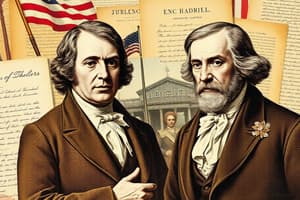Podcast
Questions and Answers
What was a common goal of the Latin American and European revolutions in the late 18th to early 20th century?
What was a common goal of the Latin American and European revolutions in the late 18th to early 20th century?
- To challenge existing hierarchies and feudal systems (correct)
- To strengthen the power of distant powers
- To establish colonial empires
- To promote absolute monarchies
Which revolution sought to abolish feudal systems and establish democratic principles in Haiti?
Which revolution sought to abolish feudal systems and establish democratic principles in Haiti?
- Spanish Revolution
- Haitian Revolution (correct)
- American Revolution
- French Revolution
What concept persisted post-revolution, denying married women full legal personhood within male-dominated domains?
What concept persisted post-revolution, denying married women full legal personhood within male-dominated domains?
- _Emancipation_
- _Coverture_ (correct)
- _Suffrage_
- _Egalitarianism_
What was a significant influence on the Latin American and European revolutions in the late 18th to early 20th century?
What was a significant influence on the Latin American and European revolutions in the late 18th to early 20th century?
Despite the American Revolution, what continued to be pervasive throughout the revolutionary era?
Despite the American Revolution, what continued to be pervasive throughout the revolutionary era?
What was a common motivation behind the Latin American and European revolutions?
What was a common motivation behind the Latin American and European revolutions?
What were some key areas affected by the Industrial Revolution in Europe?
What were some key areas affected by the Industrial Revolution in Europe?
What did the American Revolution result in?
What did the American Revolution result in?
What fueled further confrontations among nations, classes, and cultures during the Industrial Revolution?
What fueled further confrontations among nations, classes, and cultures during the Industrial Revolution?
What was a significant outcome of the American Revolution?
What was a significant outcome of the American Revolution?
Which documents were associated with the American Revolution?
Which documents were associated with the American Revolution?
What did examining revolutionary moments reveal?
What did examining revolutionary moments reveal?
Flashcards are hidden until you start studying
Study Notes
Exploring Historic Revolutions
Throughout human history, moments of profound transformation known as revolutions have reshaped societies and challenged existing institutions. These events often stemmed from complex societal tensions that boiled over, leaving indelible marks across centuries. In delving into several seminal historic revolutions, we'll uncover the motivations behind these transformational episodes and examine their far-reaching consequences.
Latin American and European Revolutions
From the late 18th to the early 20th century, numerous revolutions swept through Latin America and Europe, echoing the influence of the Enlightenment and challenging established hierarchies. The American Revolution paved the way, followed by developments in France, Haiti, Spain, and beyond—each seeking to abolish feudal systems, assert sovereign rights against distant powers, and establish democratic principles.
Women's Roles After the Revolution
Following the American Revolution, albeit gradual, there emerged discussions concerning women's rights. Although the conflict surpassed expectations regarding gender roles, the concept of coverture persisted, denying married women full legal personhood within male-dominated domains. Gender inequality remained pervasive throughout the revolutionary era, despite newfound freedoms.
The Industrial Revolution and Societal Transformations
Concurrently, the Industrial Revolution in Europe signified monumental shifts in industry, transportation, and communications, necessitating corresponding alterations in workforce organization, labor laws, and economic policies. While global trade expanded, regional disparities grew, fueling further volatility and confrontations among nations, classes, and cultures.
American Revolution: From Conflict to Constitution
Central to North American histories, the American Revolution marked a decisive rupture with Britain. An array of grievances stoked popular dissatisfaction leading to open rebellion, which eventually resulted in the drafting of the Declaration of Independence, establishment of state constitutions, formation of the Articles of Confederation, and culminated in crafting the U.S. Constitution itself.
As history reveals, each revolutionary moment brought forth new aspirations but, inevitably, left behind unresolved conflicts and ongoing disputes. By examining these watershed instances, we gain insightful perspectives on the myriad factors igniting change and the potential pitfalls inherent to navigating turbulent times.
Studying That Suits You
Use AI to generate personalized quizzes and flashcards to suit your learning preferences.




![Amerikanska Revolutionen. Källa: Robert de Vries (red.). (2010-10-03). "Amerikanska revolutionen 1776-1783". SO-Rummet. https://www.so-rummet.se/kategorier/historia/det-langa-1800-talet/amerikanska-revolutionen# [Hämtad: 2025-01-07]](https://assets.quizgecko.com/cdn-cgi/image/width=300,height=200,fit=crop,quality=75,format=webp/quiz/35c67a11374eead3082a5dce6e650da5.jpg)